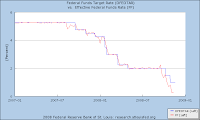 Last Thursday, the treasury had quite a poor auction of 30-year bonds. Yet over the past few days, we have seen an unprecedented spike in the price of the very same long-term treasuries. I have read some speculation that this could not occur and is largely short-term for various spurious reasons. I contend that this is a result of the Feds recent admission about the reality of quantitative easing despite the fact that informed speculators have claimed this as the only inevitable policy for quite some time. Besides the fact that the Fed seems to have completely lost control over the fed funds rate (see image, blue is target FF, red is effective FF), it appears to have decided to embark on a path of quantitative easing. This is precisely what Japan had to resort to after its asset-bubble burst. The fundamental idea is that with short-term interest rates so low, any further reductions have very little, if any, affect as stimulus. Accordingly, the central bank rapidly increases the money supply to prop up asset prices (avoiding deflation) and aims to decrease long-term interest rates (to effectively avoid a liquidity trap). Also, under a policy of quant easing the Central Bank tries to grow its balance sheet by increasing the amount of bank reserves held with it. (Interestingly, some Fed papers have concluded that quant easing largely failed in Japan.)
Last Thursday, the treasury had quite a poor auction of 30-year bonds. Yet over the past few days, we have seen an unprecedented spike in the price of the very same long-term treasuries. I have read some speculation that this could not occur and is largely short-term for various spurious reasons. I contend that this is a result of the Feds recent admission about the reality of quantitative easing despite the fact that informed speculators have claimed this as the only inevitable policy for quite some time. Besides the fact that the Fed seems to have completely lost control over the fed funds rate (see image, blue is target FF, red is effective FF), it appears to have decided to embark on a path of quantitative easing. This is precisely what Japan had to resort to after its asset-bubble burst. The fundamental idea is that with short-term interest rates so low, any further reductions have very little, if any, affect as stimulus. Accordingly, the central bank rapidly increases the money supply to prop up asset prices (avoiding deflation) and aims to decrease long-term interest rates (to effectively avoid a liquidity trap). Also, under a policy of quant easing the Central Bank tries to grow its balance sheet by increasing the amount of bank reserves held with it. (Interestingly, some Fed papers have concluded that quant easing largely failed in Japan.)This is all in favor of a flattening yield curve. But wait...theres more! As the Treasury shifted its TARP investment away from ABS, they (even investment-grade CMBS) have simply collaped in price. Accordingly, Dresdner (via FT Alphaville for us non-Dresdner clients) notes the possibility of increasing use of +10 year treasuries in convexity hedging for MBS. Since most mortgages are ~30 year it seems to me that even later maturity treasuries would be used, particularly since most of this securitization came from the hay-day of the 2000s. (I know very little about convexity hedging, any help with this is appreciated!).
Being as I'm not an expert on any of these subjects, all comments, questions, and criticisms are welcome. If you're reading this, stay tuned for a post on the USD sometime soon. Think third-world-style devaluation.
Disclosure: As of this writing, I intend (though may not) take a position in long-term maturity treasury bonds.





1 comment:
Great post about yield curve.
Post a Comment